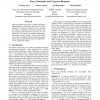119
click to vote
CORR
2010
Springer
15 years 2 months ago
2010
Springer
Description Logic Programs (dl-programs) proposed by Eiter et al. constitute an elegant yet powerful formalism for the integration of answer set programming with description logic...
181
Voted
AI
2008
Springer
15 years 2 months ago
2008
Springer
The work in this paper is directed towards sophisticated formalisms for reasoning under probabilistic uncertainty in ontologies in the Semantic Web. Ontologies play a central role...
126
click to vote
CADE
2010
Springer
15 years 3 months ago
2010
Springer
Coalgebraic description logics offer a common semantic umbrella for extensions of description logics with reasoning principles outside relational semantics, e.g. quantitative uncer...
105
click to vote
DLOG
1996
15 years 3 months ago
1996
Using quantitative models of simple mechanisms as an example domain, we show how the basic principles of consistency-based diagnosis can be implemented using description logics wi...
110
click to vote
IJCAI
1997
15 years 3 months ago
1997
Practical applications of description logics (DLs) in knowledge-based systems have forced us to introduce the following features which are absent from existing DLs: • allowing a...
118
click to vote
DLOG
1997
15 years 3 months ago
1997
We describe a method for characterizing the expressive power of description logics. The method is essentially model-theoretic in nature, and it is applied to obtain expressiveness...
149
Voted
DLOG
2000
15 years 3 months ago
2000
In this paper, we demonstrate that the main standard optimization techniques dependency directed backtracking and model merging can be adapted to description logics with concrete ...
117
click to vote
DLOG
1998
15 years 3 months ago
1998
This paper proposes a framework to learn concepts from di erent kinds of observations. We de ne a language to describe meta-concepts, that represent the sets of possible concepts ...
DLOG
1998
15 years 3 months ago
1998
We consider two recently proposed definitions of the expressive power of description logics, one due to Baader, the other due to Kurtonina and de Rijke. The proposals are non-equi...
106
click to vote
IJCAI
2003
15 years 3 months ago
2003
Many description logics (DLs) combine knowledge tation on an abstract, logical level with an interface to “concrete” domains such as numbers and strings. We propose to extend ...

